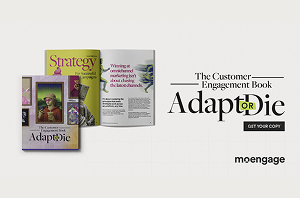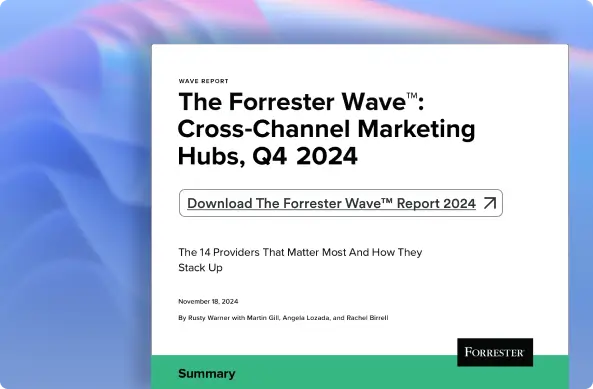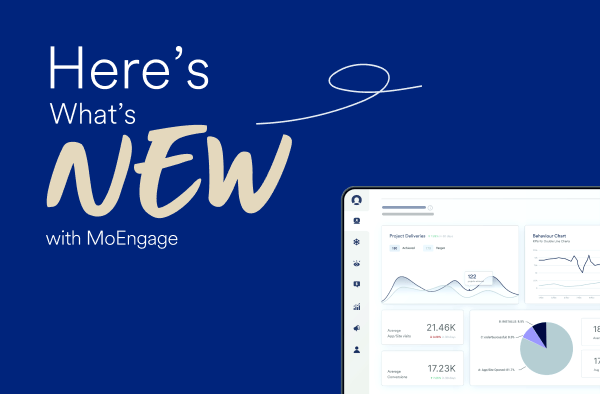Omnichannel vs. Multichannel Marketing: 5 Key Differences
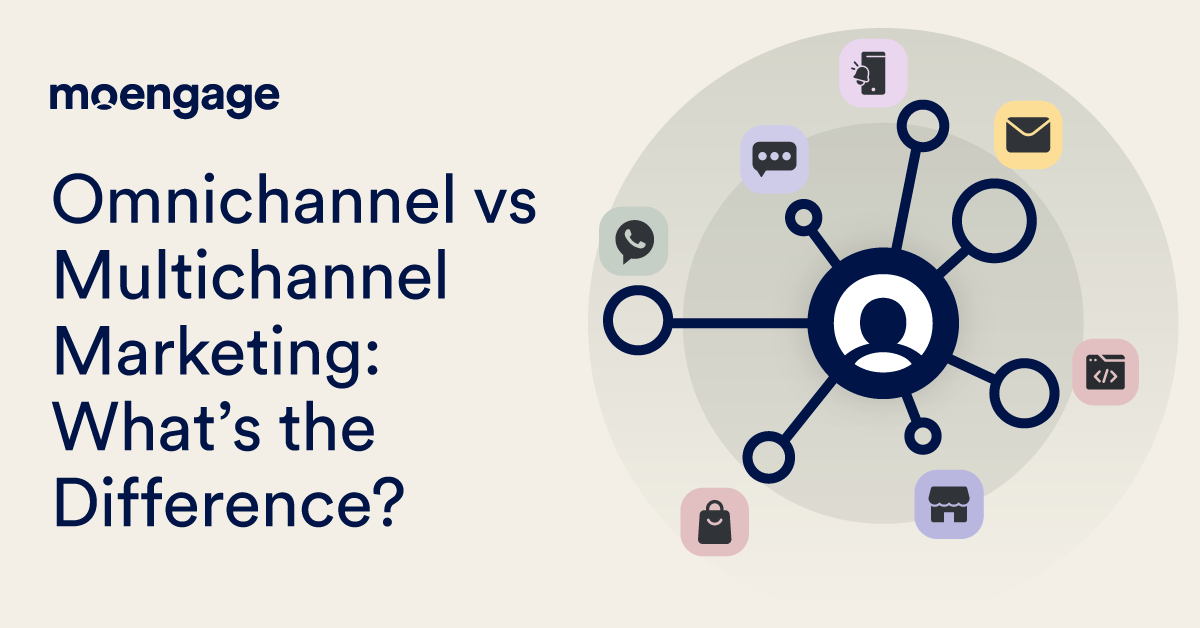
Many marketers use the terms ‘multichannel marketing’ and ‘omnichannel marketing’ interchangeably, but while seemingly synonymous, there are key distinctions in the strategies behind omnichannel vs. multichannel approaches.
Today, with 73% of customers engaging across various channels such as online, in-store, and mobile, understanding these differences is crucial. This article aims to clarify those distinctions, ensuring you can effectively reach your customers where they are.
What’s the Difference Between Multichannel and Omnichannel Marketing?
A key difference between omnichannel and multichannel marketing is that omnichannel marketing aims to interactively connect channels, while multichannel marketing uses select channels in isolation.
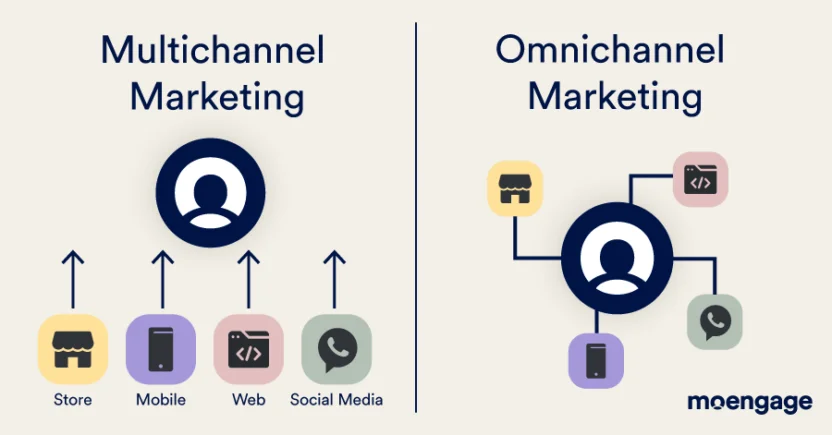
Another difference between omnichannel vs. multichannel is the kind of messaging used.
Omnichannel marketing can deliver an integrated experience with consistent messaging across platforms. In contrast, multichannel marketing may deliver differentiated messaging across different platforms.
With us so far? Good! Now, let’s get to understanding omnichannel marketing vs multichannel marketing further.
What is Multichannel Marketing?
Multichannel marketing is a strategy that allows reaching customers on multiple channels. These could be different platforms like apps, websites, and physical stores. Multichannel marketing delivers messages across platforms independently. The messaging can therefore be different due to the lack of integration.
It may seem like operating in silos is disadvantageous. However, the multichannel strategy can help with differentiated messaging between channels to allow for marketing to specific audience groups.
How Does Multichannel Marketing Work?
Multichannel marketing aims to fine-tune a brand’s reach by being present on select channels and using limited communication media. This allows brands to choose relevant channels specific to their goals.
Specifically, an effective multichannel strategy meets the customers at their preferred channels.
For example, this may include reaching potential customers via email and existing customers via mobile app notifications.
What is Omnichannel Marketing?
Omnichannel marketing is a communication strategy that allows brands to deliver a unified experience across all channels. The omnichannel marketing strategy brings all channels together for consistent messaging to customers. Here, customers will have a connected brand experience regardless of the channel.
Google’s research revealed that using omnichannel strategies contributed to 80% of customer visits to physical stores.
Want to know how it works? Read on.
How Does Omnichannel Marketing Work?
Omnichannel marketing is all about maintaining a seamless presence across channels, devices, and touchpoints to offer a cohesive or continuous experience.
Picture this: your customers can connect with you on any channel—if they visit your store and make a purchase, they can get the invoice on their phone through your brand’s app or SMS! All your messaging is integrated, opening doors for not just personalized marketing, but also uniform brand messaging. With an omnichannel marketing experience, your customer might think, “Hey, this brand’s really got my back!”
Going through omnichannel marketing examples will help you get the gist of the strategy.
Omnichannel vs. Multichannel vs. Cross-Channel
Speaking of omnichannel vs multichannel marketing, another term, ‘cross-channel marketing’, may pop up in your mind… Now things are starting to get confusing!
While omnichannel marketing integrates all channels, multichannel marketing works separately across channels, and cross-channel marketing integrates select channels into a primary channel to create a sales funnel.
Still unclear? Let’s break it down further.
- Multichannel Marketing: Multichannel marketing uses multiple channels independently, offering a fragmented experience to customers.
- Omnichannel Marketing: Omnichannel marketing offers a unified experience to customers by integrating messaging across all channels.
- Cross-Channel Marketing: Cross-channel marketing allows brands to reach customers via multiple channels to form a single, unified view of the customer. Therefore, cross-channel marketing is more integrated than multichannel marketing but not as much as omnichannel marketing is.
The table below succinctly lists the key differences between omnichannel vs. multichannel vs. cross-channel marketing.
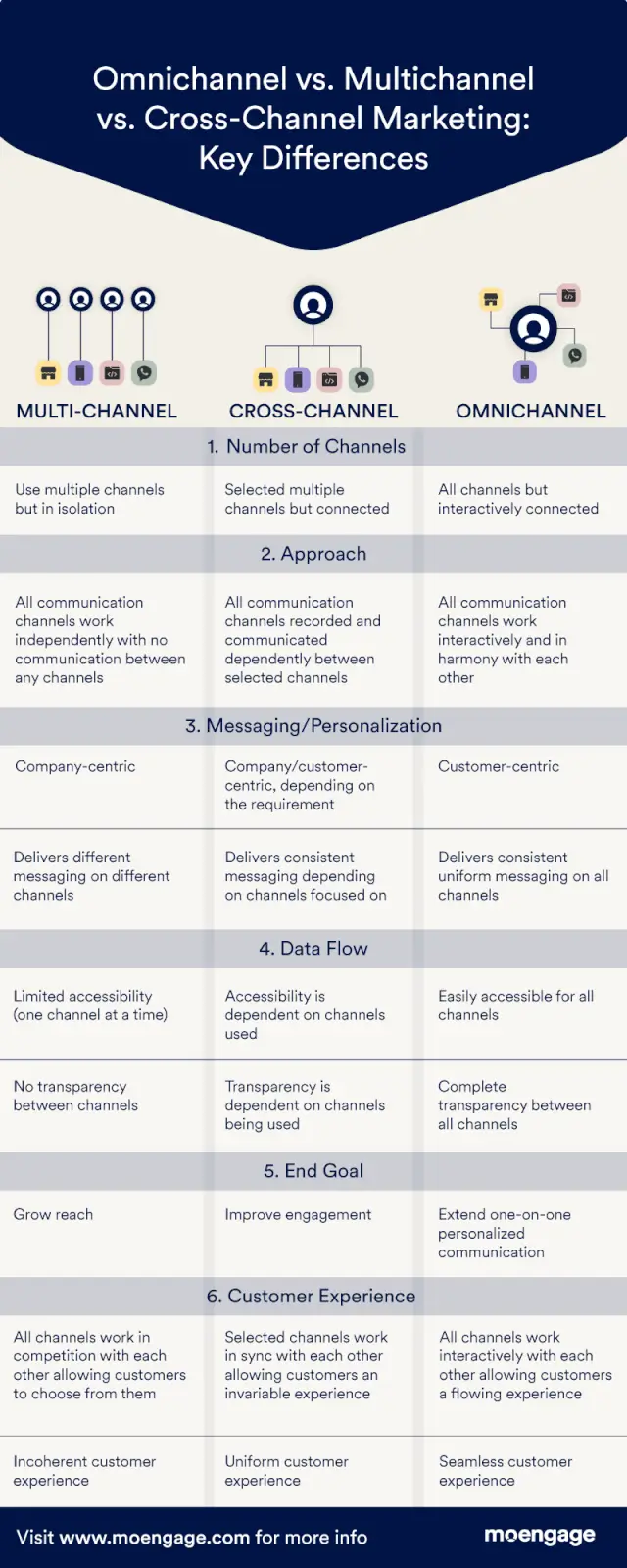
5 Key Differences Between Omnichannel and Multichannel Marketing
We have seen the primary differences between omnichannel vs. multichannel marketing at a high level. Now let’s zoom in.
1. Messaging and Communication Channels
A key difference between omnichannel and multichannel marketing is the way of using communication channels. Multichannel marketing uses multiple channels like social media, email, app notifications, and so on, separately to maximize reach and brand awareness. This approach focuses on channels relevant to your business and could result in a differentiated experience for different customer segments.
On the other hand, omnichannel marketing integrates data and customer experience across all channels or customer touchpoints. For your brand, this means delivering harmonious messaging. Therefore, omnichannel marketing is all about creating a unified ecosystem across touchpoints.
2. Personalization
Another key fact about omnichannel vs. multichannel marketing is the type of personalized experience possible. With multichannel marketing, your brand can aim to deliver tailored messaging and experiences to individual channels like email, social media, and more. The separation between channels allows brands to use different messaging or campaigns across different channels and audience groups.
On the contrary, omnichannel marketing meets the customer at all touchpoints with uniform messaging, which means personalization can happen at the customer level. Because it helps you collect real-time customer data at various touchpoints, you can use it to create a smoother customer experience. For instance, if a customer has abandoned their cart, you can send them an email or a push notification nudging them to complete the purchase.
So, an essential difference between omnichannel and multichannel personalization is that multichannel aims for channel-specific personalization, while omnichannel aims for customer-specific personalization.
3. Focus
As mentioned before, the multichannel strategy communicates to customers via select channels that are relevant to your brand, making it a business-focused or company-centric strategy. So, one of the main objectives of a multichannel strategy could be to expand your reach.
Omnichannel marketing communicates with customers wherever they connect with the business, making it a customer-focused strategy. The omnichannel strategy keeps the customer at the center of your marketing efforts to elevate brand engagement.
4. Customer Experience
If we were to compare omnichannel with multichannel marketing in terms of customer experience, omnichannel strategy could probably be the winner. With multichannel marketing, this may be a matter of hit or miss with a lot of emphasis on timing and channel selection when delivering messages.
61% of customers say they have not been able to easily switch from one channel to another when interacting with customer service. Such a disconnected experience may also not work well for customers who receive repeated messages on multiple channels.
5. Execution Effort
The amount of effort it takes for your brand with omnichannel marketing would be far greater than that of multichannel marketing. This is because one of the challenges of omnichannel marketing is that it requires a complex, adaptive ecosystem based on customer data.
Compared to omnichannel marketing, the multichannel approach can be more straightforward to execute, with low-effort strategies and identifying effective channels for your business.
5 Omnichannel vs. Multichannel Examples to Learn From
Although there are many differences between omnichannel vs. multichannel, there is no one-size-fits-all approach. You can use any strategy that suits your goals. Let’s look at some omnichannel vs. multichannel examples.
1. H&M’s Omnichannel Approach for Limited-time Offers
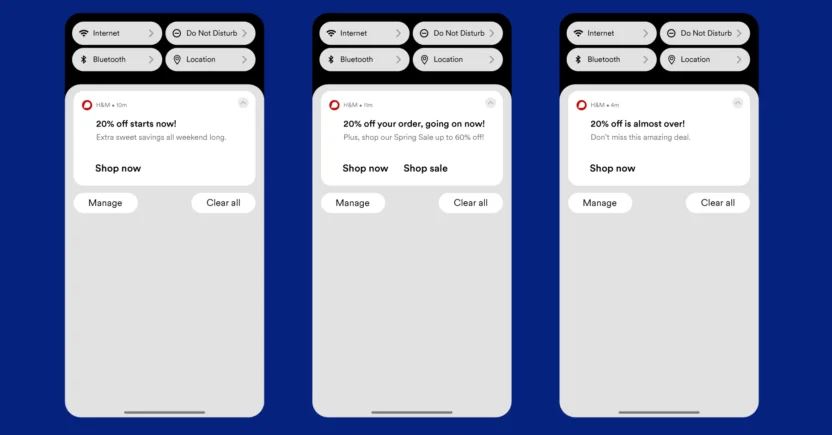
Strategy: Omnichannel
H&M’s omnichannel approach lets it efficiently promote limited-time sales. The brand uses email and push notifications to reach customers at multiple touchpoints and create a smooth experience.
Here, the email channel promotes the sale weeks in advance, making customers aware of it. Later, mobile push notifications nudge customers to act on the offers during the sale through their retail stores. With well-woven, timely messages, H&M leverages omnichannel B2C marketing to ramp up its engagement during sale periods. What you have is a well-orchestrated marketing campaign that pushes customers to engage on multiple touchpoints with the brand, be it offline or online.
Clearly, in this case, the omnichannel strategy wins in the omnichannel vs. multichannel marketing debate.
2. Walmart’s Multichannel Approach for Different Customers
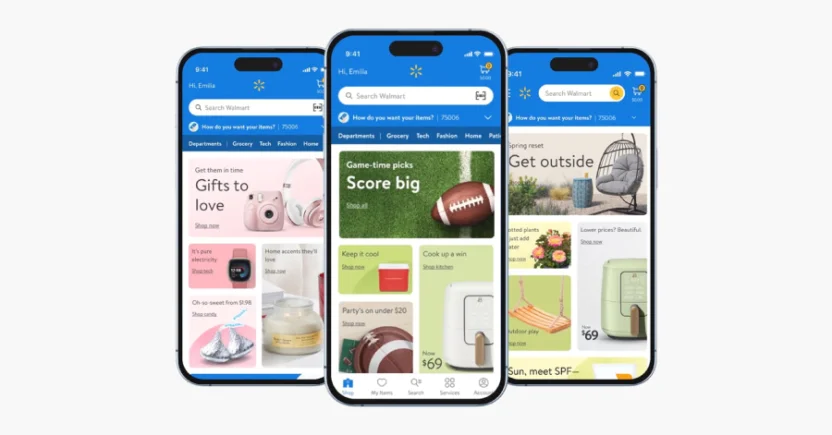
Source: https://www.cnbc.com/2023/04/03/walmart-website-app-change.html
Strategy: Multichannel Strategy
Walmart widens its customer reach by allowing customers to purchase across various channels. This multichannel strategy allows the brand to drive sales across different customer segments. Customers can buy through their preferred channels: mobile app, website, and physical stores.
While the Ecommerce grocery channel got a major push post-pandemic, offline sales still account for a significant portion of sales for Walmart, making multichannel marketing a smart strategy to target different segments.
3. Apple’s Seamless Customer Experience

Source: https://www.apple.com/apple-fitness-plus/
Strategy: Omnichannel
Apple offers customers a superior omnichannel customer experience across devices and services. Services like Fitness+ and Apple Music can be accessed and tracked using smartphones, tablets, and smartwatches. What’s more, the brand allows seamless integration across devices—be it the MacBook, iPhone, or iPad.
This is yet another example where omnichannel emerges victorious in the omnichannel vs. multichannel decision.
4. Google Chrome
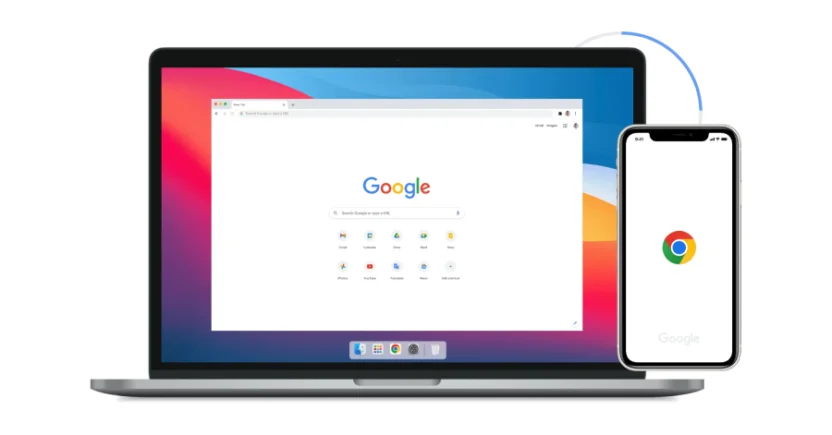
Source: https://www.google.com/intl/en_au/chrome/iphone/
Strategy: Omnichannel
When it comes to browsers, Google Chrome is clearly the king, and we all know why! Chrome syncs users’ browsing history on every device they log into, ensuring a smooth, integrated experience regardless of the device they are using.
5. Fender’s Online and Offline Marketing Efforts
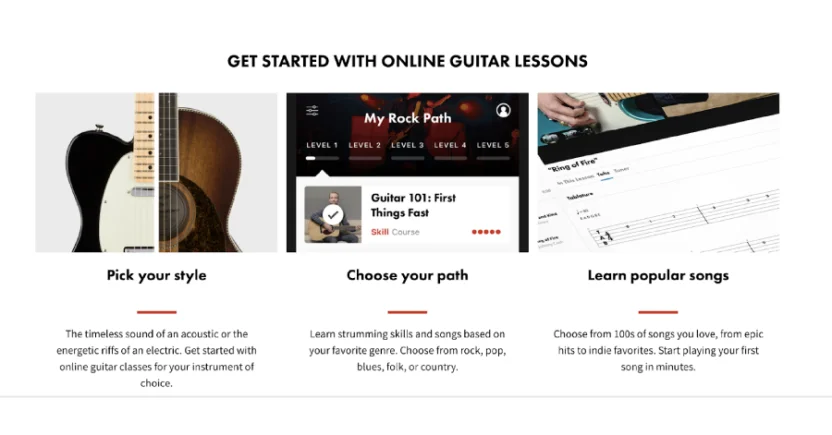
Source: https://www.fender.com/play/pages/guitar-lessons
Strategy: Multichannel
Fender doesn’t just invest in in-store marketing efforts. It goes a step ahead to provide an app to customers and prospects. Using the Fender Play app, guitar enthusiasts can get the most out of their instrument regardless of the guitar brand they own. The brand is thus expanding its reach to many app users who may make Fender their go-to brand when buying their next guitar. At the same time, it works towards building loyalty among Fender’s existing customers.
Along the journey, Fender offers product updates, accessory support, and inspiration from other musicians, creating a new generation of Fender loyalists! In this case of omnichannel vs. multichannel, the latter helps achieve brand goals better.
How to Choose Between an Omnichannel vs. Multichannel Approach
Ultimately, the choice between omnichannel vs. multichannel strategy depends on your brand’s goals. If your brand has a company-centric strategy aimed at widening reach across customers and prospects, a multichannel strategy may work well for you. On the other hand, if your brand seeks to offer a seamless and hyper-personalized customer experience, the omnichannel strategy may serve you better.
When is Omnichannel the Right Choice?
Omnichannel can be the right choice for your brand if you want to:
- Provide an integrated experience to customers
- Offer a hyper-personalized experience at all customer touchpoints
- Allow your support to access data integrated across channels
- Drive up sales and conversions via greater engagement
- Send out a consistent brand message across channels
Now, let’s look at some reasons why you may want to opt for multichannel marketing.
When is Multichannel the Right Choice?
Multichannel can be the right choice for your business if you want to:
- Expand your brand awareness and reach
- Cater to varied customer segments
- Offer a tailored experience based on each group’s preferences and needs.
- Reach first-time customers
- Drive customer retention and loyalty
Why is Omnichannel Better Than Multichannel?
Omnichannel vs. multichannel — where are we on this?
While we have seen that multichannel marketing has the advantages of a wider reach and creating brand awareness, today’s customers are looking for something else! 67% of customers shop on one device and then continue on another, showcasing how important seamless cross-device experiences are.
With the rise in the number of devices we all use, today’s customers prefer consistent brand messaging and a seamless customer experience.
The Difference Between Omnichannel and Multichannel: Concluding Thoughts
The key difference between omnichannel and multichannel marketing is that the former integrates customer experience across platforms, while the latter offers a fragmented experience across multiple channels. While you figure out the omnichannel vs. multichannel aspect of your marketing efforts, you must factor in aspects like brand focus, budgets, execution efforts, and objectives.
If execution is a constraint, you can simply automate your marketing strategy with MoEngage.
Schedule a demo with MoEngage to learn how to deliver a robust omnichannel experience.

